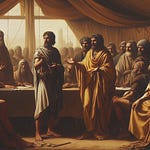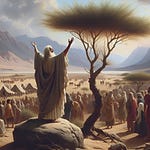Chapter Notes
Have you ever felt that burying the past is more difficult than burying a person?
In Genesis 50 we learn something of the joys and trials of both experiences.
Commentary
The final chapter of Genesis contains details of just how little and how far we have come. God said that disobedience would bring death and although man hasn’t escaped it, faith can triumph despite it. We also see that the tragedy of Cain and Abel need not be repeated, as the gospel works to offer forgiveness and reconciliation between brothers.
vv. 1–14 - Just as God told Jacob 17 years prior that ”Joseph shall put his hand upon thine eyes” (Genesis 46:4) sure enough, Joseph is there to mourn his father. Although the priests of Osiris would normally perform an embalming, Joseph requests his physicians to do it, keeping his father’s body away from pagan priests and practices. The 40 day embalming process was necessary for the journey to Canaan. It was also tradition for Egyptians to mourn 72 days for a pharaoh, so mourning 70 days for Jacob was a mark of honor. It is possible Joseph requested two days less to reflect the honor while limiting any sense of the family assimilating into Egyptian practices. Joseph then requests from Pharaoh permission to bury his father in Canaan. A significant entourage join him, made up of “all the servants of Pharaoh, the elders of his house, and all the elders of the land of Egypt” who travel with all Jacob’s descendants, except for wives and younger children. They arrive at a large open area used as a threshing floor during times of harvest. This would normally be a place of celebration, but in this case, there is mourning. Canaanites are stunned by the sight as it continues for a week, and they rename the place “the mourning of Egypt.” And so from v. 12 the brothers proceed into Canaan to lay their father’s body to rest in the place bought by Abraham.
vv. 15–21 - Just when we might think all the issues have been resolved among the children of Israel, we learn that Jacob’s sons fear what Joseph might do now that their father is gone. They appear to think that Joseph was like their uncle Esau, when he said, “The days of mourning for my father are at hand; then will I slay my brother Jacob” (Gen. 27:41). Some have questioned whether this suggestion actually came from Jacob. Why wouldn’t Jacob communicate this directly to Joseph? But perhaps as Jacob was dying, his sons lamented again the pain they brought upon their father in what they did to Joseph. In the course of such discussion, Jacob could have sensed this matter was not resolved and counseled them to confess their sin properly, which had never really happened. Their confession is an excellent example of humility and honesty. They also appeal to their shared faith, which is not unwarranted. God values the unity of His people and blesses that unity. Joseph’s response models a recognition of both God’s sovereignty and goodness, as well as man’s responsibility and wickedness. Though there is a mystery in how they work, faith accepts both to be true.
vv. 22–26 - 60 years have passed since the previous verses. Joseph reaches the ideal Egyptian age of 110 and lives to see his great-grandchildren. In addition, some believe v. 23 indicates Joseph adopted his great-grandchildren on Manasseh’s side. Whatever the case, after a challenging childhood, Joseph sees a legacy of family unity. Joseph then places an oath on the entire extended family to bring his body into Canaan, not immediately, but when God visits them in deliverance. He is then placed, not in the ground, but in a coffin. A visible monument to act as a reminder to the children of Israel, and to enable them to transport his body when the time comes. Hebrews 11 mentions this event as an example of Joseph’s faith, since he believed God would bring His people back into Canaan to fulfill His word to them. As such, the hand of faith reached beyond the coffin and took hold of the promises of God.
Application
The body of a person is the person. v. 1 speaks of Joseph interacting with Jacob even though Jacob is dead. Note this, because it is common for people at funerals to suggest that the person is not really there. That they have gone into eternity. Although that is true, we must be careful to qualify that what remains is still part of the person. You find the same truth in John 19 when Joseph of Arimathaea and Nicodemus bury the body of Jesus, we’re told “There laid they Jesus” (John 19:42). The body in the tomb was Jesus, not just a corpse. This is why Christians historically have not burned bodies. To do so reflects judgment, as in Leviticus 21:9. Obviously, it will not make a difference on the last day, but burial reflects a belief that there will be a resurrection of that very body. Remember, Job lived in this period, and he declared, “in my flesh shall I see God” (Job 19:25–27). Burial has become very expensive, but I encourage you to make it an expression of your belief in a resurrection. You may also research natural burial (sometimes referred to as green burial) since it can be more affordable.
Genuine forgiveness needs good theology. In the interaction between Joseph and his brothers, we see a picture of how unwilling sinners can be to receive forgiveness from Christ’s hand, and to present him as an unwilling Savior. But we also get a practical lesson on forgiveness between man and man. A right view of sin, ourselves, and the sovereignty of God goes a long way to help practice forgiveness. You will note how sin is not modified, confession is not qualified, penitents are not vilified, vengeance is not glorified, and faith is not nullified. Joseph does not gloss over the evil of his brothers. However, the words “but God...” in v. 20 are key. It takes faith for believers to move beyond second causes to see God’s hand in every event. Once you can see God’s sovereign hand in your life, you will be delivered from trying to take the place of God. But if faith does not rise, God is dethroned and love becomes something others must merit. Such a response is a certain path to bitterness and spiritual ruin. Did not Christ die for us while we were yet sinners? Does He not command us to love our enemies (Matthew 5:43–45) and say “be ye kind one to another, tenderhearted, forgiving one another, even as God for Christ’s sake hath forgiven you” (Ephesians 4:32)? If you are struggling with bitterness, know that you are trying to murder God and your own soul.
Things change with the passage of time. This chapter contains deliberate contrasting language to what is coming in the Exodus. You have the children of Israel traveling to the promised land with the support of Pharaoh and with chariots to protect them. The context will be different in 400 years, but there is an Exodus message attached to Jacob’s death. On the mount of transfiguration, Christ referred to His journey to the cross as His exodus in Luke 9:31. However, while Genesis ends with a coffin in Egypt, the story of Christ does not end with a tomb in Israel. Christ conquers the curse of Genesis and promises resurrection unto eternal life. Are you still held in a coffin of sin, or are you a new creation in Christ?
God’s people are exhorted to live in light of a future land. Joseph’s words in v. 24 reflect the biblical truth that “here have we no continuing city, but we seek one to come” (Hebrews 13:11). This does not come naturally, and therefore it must be taught to our families as Joseph does here. I urge parents to discuss with your children that God will only bring into the heavenly Canaan those who have trusted Christ for salvation. While Joseph needed His bones to be carried into Canaan, Christ walked Himself out of the tomb! That is gospel victory! Do you believe it?
“Joseph’s brethren did just as they liked when they put him into the pit. Potiphar’s wife followed the dictates of her own abandoned lust in tempting him. And yet, notwithstanding all the freedom of their will, it was ordained of God and worked together for one great end, to place Joseph on the throne, for as he said himself, “Ye meant it for evil, but God intended it for good, that he might save your souls alive!” There was the ordinance of God’s providence in it as clearly as there is light in the sun.” — Charles Spurgeon











